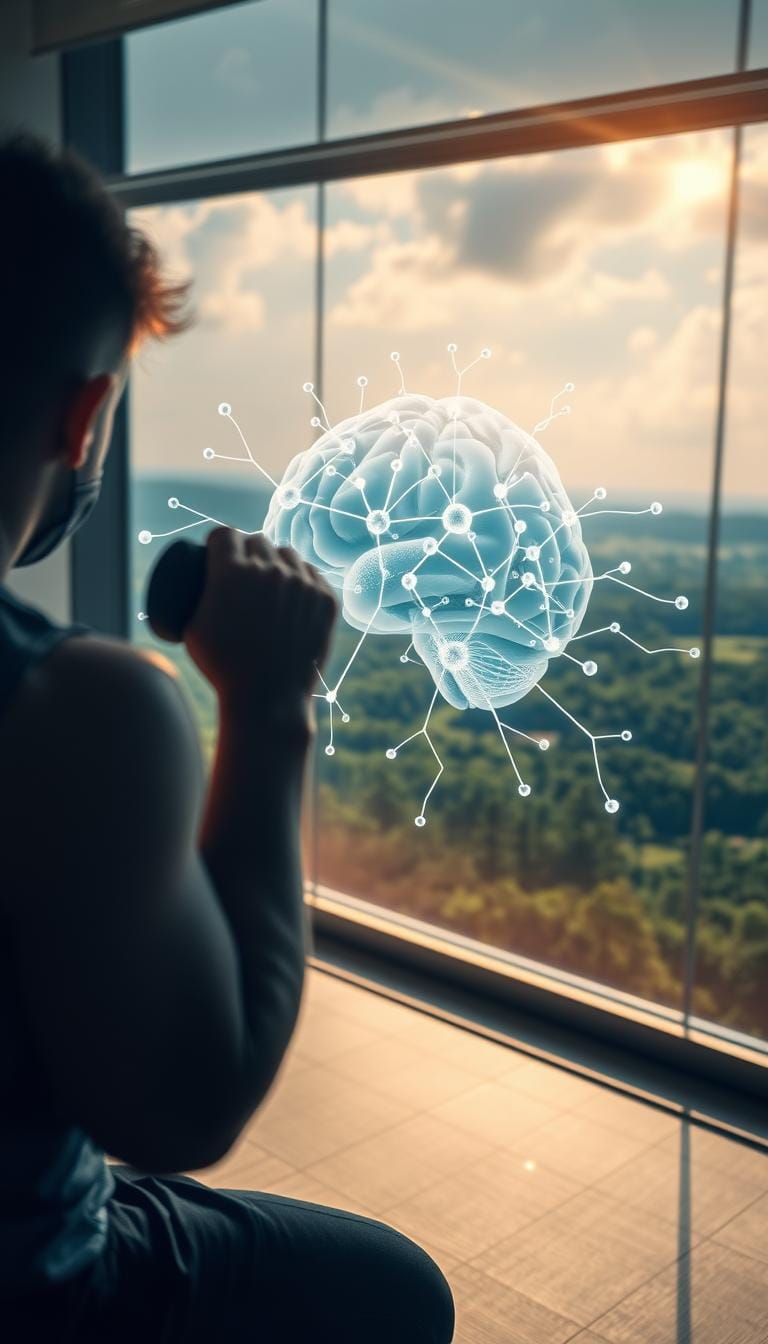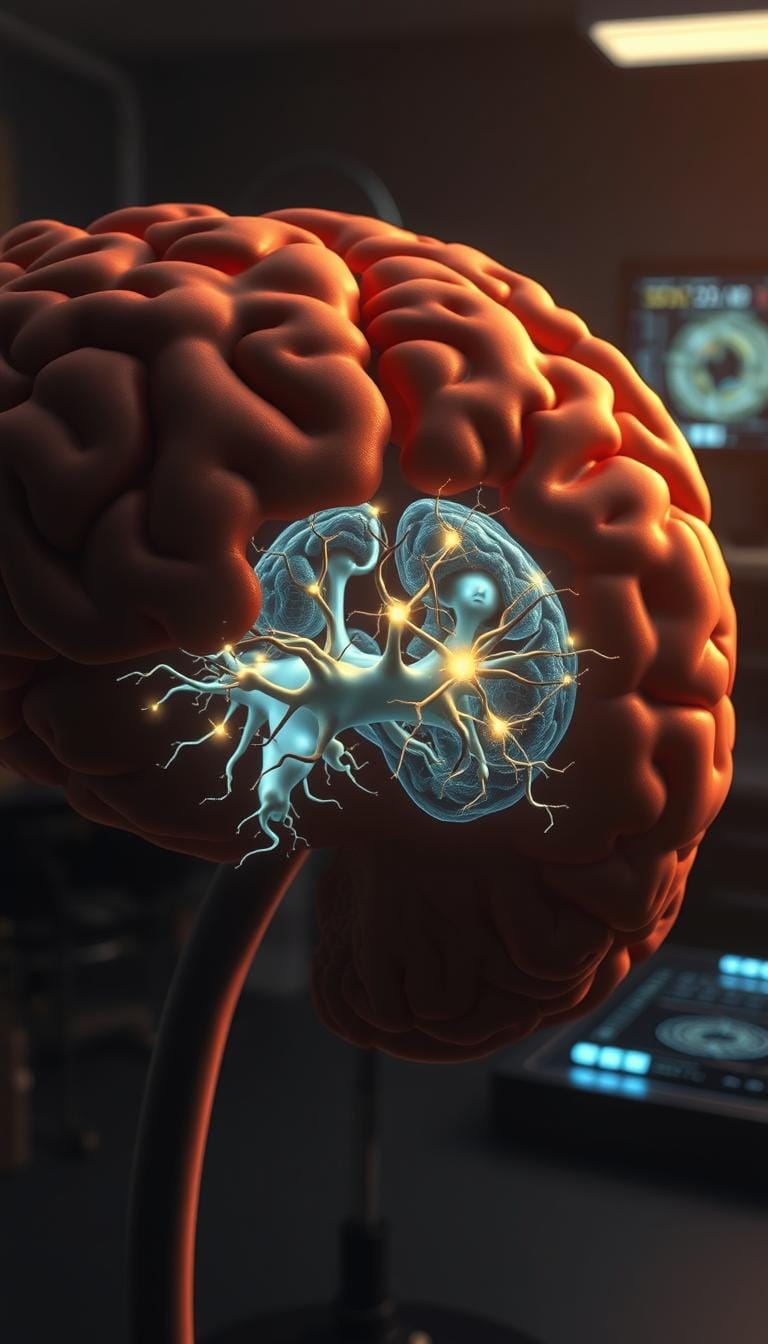The Role of Sleep in Memory Consolidation: How to Boost Learning in 3 Steps
Table of Contents
I remember many nights without sleep, only to forget important details on exam day. It wasn’t until later that I learned about the importance of sleep for memory. Studies show sleep is key in making short-term memories last longer.
Sleep deprivation hurts this process, making it hard to remember things. But, enough sleep helps improve memory, leading to better learning. Here, I’ll share three simple steps to use sleep to your advantage.

Knowing how sleep helps with memory is the first step to better learning. Let’s explore the three steps to help you reach your learning goals.
Understanding the Sleep-Memory Connection
Sleep is key to memory, showing how we learn and remember. It’s clear that a good night’s sleep is vital for our brain to work well.
What Happens to Your Brain During Sleep
Our brain goes through different stages when we sleep. REM (Rapid Eye Movement) and non-REM sleep are the main types. REM sleep helps with procedural memories, while non-REM strengthens neural connections.

The Science Behind Memory Formation
Memory making involves many brain parts. The hippocampus helps start the memory process, and the neocortex stores memories long-term. Sleep helps move information from the hippocampus to the neocortex, making memories stronger.
| Sleep Stage | Memory Type | Function |
|---|---|---|
| REM Sleep | Procedural Memory | Consolidation of skills and habits |
| Non-REM Sleep | Declarative Memory | Strengthening of factual knowledge |
The Role of Sleep in Memory Consolidation
Sleep is key in making short-term memories last longer. During sleep, the brain goes over old memories, making them stronger. This happens mainly in the REM stage.
Transforming Short-Term to Long-Term Memory
Changing short-term to long-term memory is complex. REM sleep is vital for this. It helps the brain solidify memories. Without enough sleep, learning new things gets harder.
Research Evidence Supporting Sleep’s Memory Benefits
Many studies show sleep’s role in memory. For example, students who slept well before a test did better. Another study found REM sleep boosts memory recall.
| Sleep Stage | Memory Consolidation Process | Impact on Learning |
|---|---|---|
| REM Sleep | Replays and revises neural pathways | Enhances memory recall and learning retention |
| Non-REM Sleep | Strengthens neural connections | Improves memory stability |

Knowing how sleep helps memory can improve learning. By valuing sleep, we can better learn and remember new things.
Sleep Stages and Their Impact on Learning
Sleep is not just one state; it has different stages that affect learning and memory. Knowing these stages is key to enhancing memory through proper sleep. Both REM and non-REM sleep are vital for learning.
The Function of REM Sleep in Memory Processing
REM sleep is when your eyes move fast and your brain works like it’s awake. It’s when the brain sorts through memories, focusing on emotional and procedural ones. Studies show that REM sleep strengthens brain connections, improving memory.
Some key functions of REM sleep include:
- Processing and consolidating emotional memories
- Enhancing learning through memory reactivation
- Supporting the integration of new information into existing knowledge
Non-REM Sleep and Its Cognitive Benefits
Non-REM sleep, with its various stages, is also essential for thinking clearly. It helps remove brain waste, lowers brain activity, and refreshes the brain for the next day. Non-REM sleep is important for solidifying memories, like facts and events.
The benefits of non-REM sleep include:
- Clearing brain waste through the glymphatic system
- Reducing synaptic activity to conserve energy
- Enhancing the consolidation of declarative memories
The Memory Consolidation Process During Sleep
Sleep is key for memory consolidation. It turns my experiences into lasting knowledge. During sleep, my brain strengthens connections between neurons, making memories easier to recall.
Neural Replay
Neural replay is a major part of memory consolidation. It reactivates neural pathways formed during learning. As I sleep, my brain replays and revises past events, improving memory consolidation.
Synaptic Homeostasis
Synaptic homeostasis is another important process. It strengthens strong neural connections and weakens the weak ones. This makes neural communication more efficient, helping me remember better. Good sleep quality supports this process, leading to better memory.
- Neural replay enhances memory consolidation by reactivating neural pathways.
- Synaptic homeostasis strengthens important connections, improving memory recall.
Understanding how sleep helps memory, I can improve my sleep. This way, I can learn and remember better.
How Sleep Deprivation Sabotages Your Learning Ability
Lack of sleep doesn’t just make us feel tired. It also hurts our ability to learn by affecting memory. When we don’t sleep enough, our brain struggles to process and keep new info.
Sleep is key for forming memories, and not getting enough can harm our thinking. This can make it hard to focus, learn new things, and remember what we already know.
Cognitive Impairments from Lack of Sleep
Not sleeping well messes with our brain’s work. It leads to trouble paying attention and solving problems. It also makes it harder to learn new stuff because our brain can’t make new connections.
The Cumulative Effects of Sleep Debt on Memory
Building up a sleep debt can hurt our memory and thinking skills over time. The more we skip sleep, the worse our brain gets at keeping memories. This can even lead to lasting learning problems.
Prioritizing sleep is key for keeping our brain sharp and helping us learn. By knowing how important sleep is, we can take steps to protect our learning ability.
Common Sleep Disorders That Impair Memory Consolidation
Sleep disorders can make it hard to remember things. They affect how well we learn and remember. We’ll look at some common sleep disorders that hurt memory.
Common sleep disorders include insomnia, sleep apnea, and restless leg syndrome. These can mess up our sleep and hurt our memory and thinking skills.
Insomnia and Its Effects on Learning
Insomnia makes it hard to fall or stay asleep. This can hurt how well we remember things. Studies show people with insomnia do badly in learning and remembering.
Insomnia can make it hard to:
- Focus
- Stay focused
- Remember things
Sleep Apnea, Restless Leg Syndrome, and Cognitive Function
Sleep apnea and restless leg syndrome also hurt thinking skills. Sleep apnea means breathing stops during sleep. Restless leg syndrome makes legs feel uncomfortable. Both can mess up sleep and memory.
These disorders can hurt thinking in many ways:
- Make it hard to form memories
- Lower problem-solving skills
- Make cognitive decline more likely
Step 1: Optimize Your Sleep Environment for Better Memory
The first step to better memory through sleep is to make your sleep area perfect. A cozy sleep space can greatly improve your sleep quality. This, in turn, helps your brain remember things better.
Creating the Ideal Bedroom Setting
To make your bedroom the best for sleep, focus on comfort and calm. Choose a soft mattress and pillows. Pick soothing colors for your walls and keep the room tidy. A clean and comfy room reduces stress, which is key for better sleep and memory.
Temperature, Light, and Sound Considerations
Temperature, light, and sound greatly impact your sleep. Keep your bedroom cool, around 60-67°F, for better rest. Darkness is also key; use blackout curtains if needed. Also, reduce noise or use white noise machines for a peaceful sleep.
Establishing a Technology-Free Zone Before Bed
Make your bedroom a tech-free zone before bed. The blue light from screens can mess with your sleep hormone, melatonin. Avoid screens for at least an hour before bed. Instead, try relaxing activities like reading or meditation.
| Sleep Environment Factor | Ideal Condition | Benefit |
|---|---|---|
| Temperature | 60-67°F | Promotes better sleep quality |
| Light | Darkness | Enhances melatonin production |
| Sound | Minimal noise or white noise | Reduces sleep disturbances |
Step 2: Establish a Consistent Sleep Schedule
Setting a regular sleep schedule boosts your brain’s memory consolidation. It helps your body’s internal clock, which is key for thinking clearly.
Aligning Sleep with Your Natural Circadian Rhythms
Our bodies naturally follow a sleep-wake cycle. Matching your sleep schedule to this rhythm improves sleep quality. Being in natural light during the day and dark at night helps your internal clock. This makes your sleep better for memory consolidation.
Developing a Relaxing Pre-Sleep Routine
A calming pre-sleep routine tells your brain it’s time to rest. Reading, meditation, or a warm bath can relax you. Make this routine the same every night to prepare your brain for sleep.
Maintaining Consistent Sleep Patterns on Weekends
It’s easy to skip the regular sleep schedule on weekends. But, sticking to your sleep pattern, even on weekends, is key for memory consolidation. Irregular sleep can cause sleep inertia and lower brain function.
To wrap it up, a consistent sleep schedule means aligning with your natural rhythms, having a calming routine, and keeping it up on weekends. These steps help your brain better remember things.
- Align your sleep schedule with your natural circadian rhythms.
- Develop a calming pre-sleep routine to signal your body for sleep.
- Maintain your sleep schedule consistency, including on weekends.
Step 3: Use Strategic Learning Techniques That Leverage Sleep
To improve memory, it’s key to use learning methods that match with sleep. This helps people remember and recall information better. It’s about making learning work well with sleep cycles.
Implementing Sleep-Learning Intervals for Maximum Retention
One good method is using sleep-learning intervals. This means studying in short bursts, then sleeping. Studies show it boosts memory by letting the brain process info while we sleep. For example, a study found napping after learning helped people remember better than staying awake.
Sleep-learning intervals help students and anyone wanting to learn better. Taking breaks and sleeping can make studying more effective and help remember things longer.
Scheduling Pre-Sleep Study Sessions for Critical Information
Another approach is studying important stuff before bed. This uses sleep to strengthen memory. But, don’t study too late, as it can mess with sleep quality.
Research points out that the time right before sleep is key for memory. Studying important stuff then can make sleep more effective for memory.
Using Memory Reactivation Techniques During Sleep
Memory reactivation during sleep is also helpful. Listening to recordings of learned info while sleeping can strengthen memories. While results vary, it’s a promising way to improve memory.
By using these learning strategies, we can make the most of sleep for better learning. Whether it’s through sleep-learning intervals, studying before bed, or memory reactivation, sleep can greatly enhance memory and brain function.
Nutrition and Lifestyle Factors That Support Sleep-Based Learning
Nutrition and lifestyle are key for good sleep, which is essential for learning. Eating right and staying active can boost sleep quality. This, in turn, helps improve how well we learn.
Foods and Beverages That Promote Healthy Sleep Cycles
Foods like turkey, chicken, and fish help make serotonin, which relaxes us and helps us sleep. Cherries and walnuts, rich in melatonin, help keep our sleep cycles regular. Herbal teas, like chamomile, also calm us down.
| Food/Beverage | Nutrient | Benefit |
|---|---|---|
| Turkey, Chicken, Fish | Tryptophan | Promotes serotonin production |
| Cherries, Walnuts | Melatonin | Regulates sleep-wake cycles |
| Chamomile Tea | Apigenin | Aids in relaxation and sleep |
Physical Activity and Its Impact on Sleep Quality
Regular exercise can make sleep better by lowering stress and anxiety. It helps our body’s clock stay in sync, leading to better rest. But, avoid hard workouts before bed to avoid feeling too awake.
Adding a balanced diet and regular exercise to your life can greatly improve sleep. This, in turn, supports memory and learning.
Practical Applications for Different Types of Learners
Exploring the importance of sleep for memory shows how different learners can benefit. Students, working professionals, and older adults can improve their learning by adjusting their sleep. Tailored sleep strategies can make a big difference.
Sleep Strategies for Students During Exam Periods
Students can boost their memory by sticking to a sleep schedule during exams. A regular bedtime and a quiet sleep space are key. Also, strategic napping can help fill in any sleep gaps.
- Establish a relaxing pre-sleep routine
- Avoid caffeine and electronics before bedtime
- Use a sleep mask or earplugs to improve sleep quality
Memory Enhancement for Working Professionals
Working professionals can improve their memory by using sleep to solidify new skills. Scheduling pre-sleep study sessions for important info is helpful. A consistent sleep schedule and a sleep-friendly environment are also important.
- Review important information before bed
- Use visualization techniques to aid memory
- Maintain a sleep diary to track sleep patterns
Sleep Approaches for Older Adults and Lifelong Learners
Older adults and lifelong learners need sleep strategies that fit their needs. Keeping a regular sleep schedule and avoiding late-night activities are key. Morning light exposure can also help regulate their body clock.
- Establish a relaxing bedtime routine
- Avoid heavy meals close to bedtime
- Consider gentle stretching or yoga before bed
By using these sleep strategies, learners of all ages can improve their sleep and memory retention. This leads to better cognitive abilities and learning outcomes.
Conclusion: Harnessing the Power of Sleep for Cognitive Excellence
Understanding how sleep helps with memory is key to better learning and thinking. By knowing how sleep and memory work together, we can help our brains learn and remember better.
Following three steps can really help. First, make your sleep area comfy. Second, sleep at the same time every day. Third, use learning methods that work well with sleep. These steps can make your brain better at remembering things and thinking clearly.
By using these tips and paying attention to how sleep helps with memory, we can improve our learning and thinking. This leads to better performance and a sharper mind.






